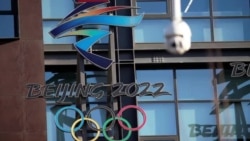The International Olympic Committee (IOC) launched a media campaign on February 4, exactly a year before the start of the Winter Olympic Games to be held in Beijing, China.
An IOC press release quoted its president, Thomas Bach, promising “safe and secure” games and expressing “great confidence” in China. Bach said his confidence was based on China’s handling of the coronavirus.
“Having seen how China is overcoming the coronavirus crisis, we are very confident that our Chinese hosts will ensure safe and secure Olympic Games … we can say already now with great confidence: China is ready. Ready to welcome the world’s best winter sports athletes for unforgettable Olympic Winter Games Beijing 2022.”
Bach’s praise for China is misleading, however, given that it overlooks some criticism of not only the country’s initial response to the virus but reports that China recently withheld data from World Health Organization investigators.
Since the pandemic’s start, journalists, scientists and politicians have accused the Chinese government of lacking true transparency and failing to warn the world about the virus in a timely manner.
At first, the World Health Organization repeatedly praised China for its “speedy response” and “very impressive” commitment to transparency.
Then, last June, the Associated Press reported that the praise was meant to encourage Chinese authorities to share urgently needed data. For the first time since the start of the COVID-19 outbreak in late 2019, the WHO disclosed evidence of a “significant delay” in sharing data and Chinese efforts to limit what was released “to minimal information, required by law.”
“Between the day the full [coronavirus] genome was first decoded by a [Chinese] government lab on Jan. 2 [2020] and the day WHO declared a global emergency on Jan. 30, the outbreak spread by a factor of 100 to 200 times, according to retrospective infection data from the Chinese Center for Disease Control and Prevention,” the AP reported.
The Chinese government’s delay in sharing information contributed to the SARS-Cov-2 virus’s deadly global march, which has claimed 2.4 million lives and shaken the world economy in just a year.
Last week, as a WHO mission was in China investigating the origins of the pandemic, news reports said Chinese authorities had refused to share raw patient data from the first 174 COVID-19 cases identified in early December 2019.
Jake Sullivan, the White House national security adviser, said in response that it is imperative that the WHO report on the pandemic’s origins be independent and free from “alteration by the Chinese government.”
The fact that new COVID-19 cases, and even new clusters of cases, continue to crop up in China also raises questions about the country’s readiness to protect world athletes next year.
On February 15, the Chinese health authorities reported 16 new coronavirus cases, and nine cases the previous day. Chinese authorities said all the cases had originated oversees, Reuters reported.
In January, the country saw its worst COVID-19 outbreak since last March, with new clusters emerging in three provinces simultaneously, although the numbers were significantly lower than in many other countries. In Hebei province, hundreds of cases emerged in the capital of Shijiazhuang; authorities ordered a lockdown and put 20,000 people in quarantine.
Raising further questions about China, a nine-month investigation by the AP and the Atlantic Council Digital Forensic Research Lab published Monday accused China of taking the lead in spreading state-sponsored disinformation about the virus. To be sure, China was not alone:
“From Beijing and Washington to Moscow and Tehran, political leaders and allied media effectively functioned as superspreaders, using their stature to amplify politically expedient conspiracies already in circulation. But it was China – not Russia – that took the lead in spreading foreign disinformation about COVID-19’s origins, as it came under attack for its early handling of the outbreak.”
The AP noted that, in part, “Chinese officials were reacting to a powerful narrative, nursed by QAnon groups, Fox News, former President Donald Trump and leading Republicans, that the virus was instead manufactured by China.”
In Wuhan, the WHO mission has found 13 previously unknown strains or genetic sequences of SARs-Cov-19 virus, which can provide key insights in the geography and timing of the disease before its outbreak in December, Peter Ben Embarek, the lead investigator for the WHO mission, told CNN. The mission’s findings signal that the outbreak in Wuhan was much wider than previously thought, Embarek said.






